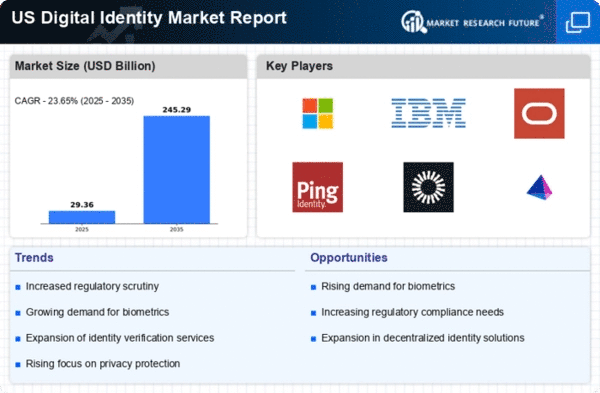Growing Cybersecurity Concerns
The increasing frequency and sophistication of cyberattacks has heightened the focus on security within the digital identity market. Organizations are compelled to adopt robust identity verification solutions to protect sensitive data and maintain customer trust. In 2025, it is estimated that cybercrime will cost businesses globally over $10 trillion annually, underscoring the urgency for enhanced security measures. This trend is particularly pronounced in the US, where regulatory bodies are emphasizing the need for stringent identity management protocols. As a result, companies are investing heavily in advanced technologies, such as multi-factor authentication and biometric systems, to safeguard their digital identities. The digital identity market is experiencing a surge in demand for solutions that comply with regulations. These solutions also provide a secure environment for users.
Increased Digital Transactions
The rapid shift towards digital transactions in the US economy is driving growth in the digital identity market. As e-commerce continues to expand, businesses require reliable identity verification methods to prevent fraud and ensure secure transactions. In 2025, it is projected that e-commerce sales in the US will surpass $1 trillion, creating a pressing need for effective identity solutions. This trend is further fueled by the rise of mobile payments and digital wallets, which necessitate robust identity verification processes. Consequently, organizations are increasingly adopting technologies that streamline user authentication while enhancing security. The digital identity market is thus positioned to benefit from this surge in digital transactions, as companies seek to implement solutions that facilitate seamless and secure customer experiences.
Adoption of Remote Work Practices
The shift towards remote work has transformed the landscape of the digital identity market. As organizations adapt to flexible work arrangements, the need for secure identity verification solutions has become paramount. In 2025, it is estimated that over 30% of the US workforce will be engaged in remote work, necessitating the implementation of secure access protocols. This trend has prompted businesses to invest in identity management systems that can effectively authenticate users regardless of their location. The digital identity market is witnessing increased demand for solutions that support remote access. These solutions ensure compliance with security standards. As companies prioritize the protection of sensitive information, the focus on secure digital identities is likely to intensify.
Emergence of Decentralized Identity Solutions
The concept of decentralized identity is gaining traction within the digital identity market, driven by the need for user control over personal data. This approach allows individuals to manage their identities without relying on centralized authorities, thereby enhancing privacy and security. In the US, the adoption of decentralized identity solutions is expected to grow as consumers become more aware of data privacy issues. By 2025, it is anticipated that 20% of organizations will implement decentralized identity frameworks, reflecting a shift towards user-centric identity management. This trend presents opportunities for innovation within the digital identity market, as companies develop solutions that empower users while ensuring compliance with regulatory requirements.
Technological Advancements in Identity Verification
Technological innovations are reshaping the digital identity market, particularly in the realm of identity verification. Advancements in artificial intelligence, machine learning, and blockchain technology are enabling more efficient and secure identity management solutions. In 2025, it is projected that the market for AI-driven identity verification will grow at a CAGR of 25%, highlighting the increasing reliance on technology for identity solutions. These advancements not only enhance the accuracy of identity verification processes but also streamline user experiences. As organizations seek to leverage these technologies, the digital identity market is likely to witness a surge in demand for solutions that integrate cutting-edge technologies to improve security and efficiency.
















